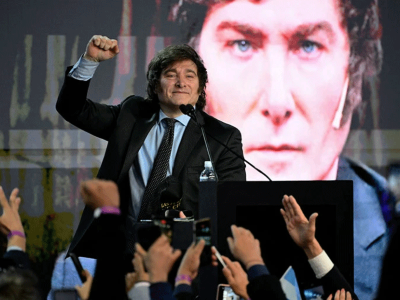Argentina goes to the polls on 22 October to elect a new president. Scientists, including me, are deeply concerned: there is a very real prospect that the candidate of the far-right Libertarian Party, Javier Milei, could be our country’s next leader.
Argentinian presidents have far-reaching powers. They are both head of state and head of government, as well as commander-in-chief of the armed forces. Milei is an economist and darling of certain media circuits, who expresses admiration for Donald Trump while espousing anti-science views and advocating an extreme minimalist state. He has repeatedly denied the existence of anthropogenic climate change. He has said that he wants to shut down the ministries of the environment and health, as well as the Ministry of Women, Genders and Diversity. He wants to privatize or eliminate the National Scientific and Technical Research Council, CONICET. He plans to replace free public primary, secondary and university education with a voucher system.
Milei won an open primary election on 13 August with about 30% of the vote, ahead of candidates for the conservative and centre-left coalitions, who totalled 28% and 27%, respectively. Current opinion polls are changing almost daily, but often put him ahead. If, on 22 October, no candidate wins 45% of the vote or 40% with at least a 10 percentage point lead over the runner-up, a run-off election will be held in November.
Milei’s plans are short-sighted, and they upend Argentina’s long traditions of prioritizing state-funded education and valuing science. For a country classified by the World Bank as upper-middle-income, Argentina has a proud history of research. It has produced three Nobel prizewinners in science: physiologist Bernardo Houssay, biochemist and physician Luis Federico Leloir and biochemist César Milstein. Argentinian diplomat Raúl Estrada-Oyuela was the chair of negotiations and a leading force for the 1997 Kyoto Protocol, the first legally binding global treaty on climate change.

Argentina election: front runner vows to slash science funding
CONICET, founded in 1958, has ranked as the top scientific institution in Latin America for the past five years. Its 300 research institutes employ almost 12,000 full-time researchers in all scientific disciplines. Milei proposes to privatize it, given what he calls its lack of productivity. “CONICET as it exists today will no longer exist,” he said in September.
Knowledge developed by CONICET and Argentina’s national universities has facilitated important achievements — such as the manufacturing of COVID-19 testing kits during the pandemic and the development of drought-resistant soya beans and wheat seeds. Monoclonal antibodies, which Milstein developed, are a major treatment for diseases. Just weeks ago, CONICET researchers launched the biotechnology company Galtec in Buenos Aires to produce monoclonal antibodies to treat cancer and immunological disease, using an approach that has shown promise in a randomized controlled phase III clinical trial (N. Bannoud et al. Proc. Natl Acad. Sci. USA 120, e2214350120; 2023).
According to Milei’s logic, the 30 years of basic research underlying these treatments were a parasitic activity conducted at the expense of the state and the people. In the almost 60 years since I graduated from the University of Buenos Aires in 1965, and in my several decades as a geologist there, I have never heard a politician propose such extreme ideas in my country. Milei’s words have become a daily subject of private and open discussions in the lunch rooms, classrooms and hallways of academic institutions. Many students are talking about going overseas.

Argentina’s scientists struggle amid slipping peso and rising inflation
Researchers are banding together in the face of these threats. In August, the presidents of the country’s main universities met and composed a statement defending access to higher education as a right of Argentinians and a public good. The National Academy of Exact, Physical and Natural Sciences of Argentina, of which I am the president, released a statement calling on society to be aware that without education and science, there is no future for Argentina. Many students and academics are preparing to make that point on the streets in the event Milei is elected.
There is no question that Argentina is in a deep economic crisis and needs to make important changes. The country has experienced more than 8 years of economic hardship, including annual inflation of more than 120%, and is about US$43 billion in debt to the International Monetary Fund. Forty per cent of the population lives in poverty. Yet there has always been cultural consensus that education and science are key to the progress and development of the nation, underlying commercial wealth, generating national and international patents and creating technology-based companies.
The statistics show that the countries that invest the most in research and development advance fastest. Israel and South Korea each invest around 5% of their gross domestic product; the United States invests 3.46%. Argentina’s figure is 0.5%. Contrary to Milei’s plans, investment in science and scientific education needs to increase — for the future of the country and to achieve a better quality of life for its inhabitants. Scientists in Argentina and beyond must shout louder and make their voices heard.
